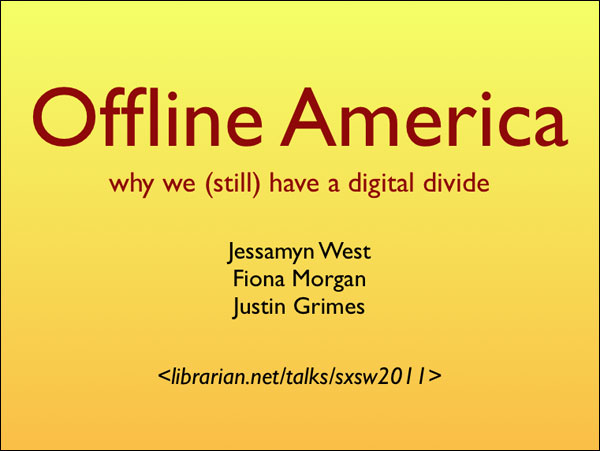Talking about the digital divide in Connecticut is a lot different from talking about it in Texas, or even Vermont. Unlike most states I’ve looked at, Connecticut really doesn’t have a large population of people who live in an area where they can’t get broadband. I’m sure it has the same numbers of offline people, generally speaking, but whatever their reasons for being offline are, they’re not for lack of access. I admit, I played this for laughs a bit at my CLA since I know that people aren’t going to confuse broadband access with technological know-how and will still see that there is work to be done.
All my talks went well. Here’s what I’ve been up to recently
- Last Thursday I was on a panel with some interesting people including the soon-to-be-president of ALA Molly Raphael. We answered some provocative questions about the future of libraries and mostly had a great time.
- Friday I gave my talk about developing a technology curriculum for libraries. For those of you used to my usual stuff, this was a departure. Not heavily attended–it was in one of the last timeslots of the conference–but I was pleased with it. If you’re considering a technology curriculum, you might be interested in my short set of notes/slides. I got to present with Anna Fahey-Flynn who is Curriculum Development Librarian at Boston Public and it was really interesting to see how their tech instruction program is coming together.
- Over the weekend I walked around in the sun in Massachusetts and then headed to CT for the CT Library Association conference. Before attending the conference I was interviewed for public acess TV in Manhattan about the Google Books project and copyright and a few other things. No idea when this will go live, but if you think you’ve seen me on tv talking about Google Books, you may have.
- Tuesday I gave a talk about myths about the digital divide, similar to my Texas talk but with some local examples.
As usual, I also got to attend some great presentations including a talk by BPL and the Internet Archive [at MLA] about how they’re working together to provide digital access to library content via Open Library. This may be a personal thing, but I’m always excited when libraries test boundaries and tell us “We checked with our lawyers and they think this is an acceptable level of risk.” I also saw a CMS smackdown/comparison [Drupal vs. WordPress] by Polly-Alida Farrington and Shanon Clapp which was full of good information and delivered with a friendly “you can do it!” approach. I also saw John Palfrey’s closing keynote talking about the digital divide and some of what Harvard’s Library Lab has been up to, and the DPLA and other things. I’ve mostly seen him in contexts where he was talking to non-librarians so it was fun to see him explaining a lot of these big idea projects on my home turf.
I’m home for a bit, back to teaching my Know Your Mac classes, staffing drop-in time, filling in at the public library and waiting for my book to be in print [this week, here’s hoping] and then travelling to Portland at the end of the month for the Oregon Virtual Reference Summit.

